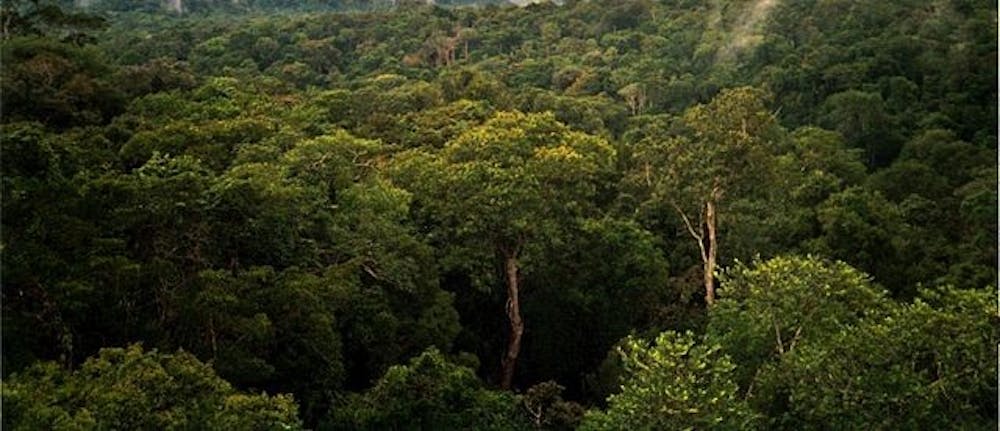For the second time in two years, the World Health Organization has declared a global health emergency — the first being COVID-19 and second monkeypox. Although these two viruses have more differences than commonalities, they are both zoonotic in nature. Zoonotic diseases derive from animals and can be transmitted to humans as a result of an event called spillover. Understanding spillover is crucial to understanding why such outbreaks are not unprecedented forces of nature, or flukes. Rather, these events are reasons for serious current and future concern that scientists have already been warning us about all along. It is time we acknowledge the reality that a major outbreak of disease will happen again. However, we can do something to potentially prevent future spillovers and subsequent outbreaks, especially by addressing the climate crisis.
Spillover is relevant to the COVID-19 pandemic and monkeypox, as scientists have predicted that both viruses began in a reservoir host before spilling into secondary hosts such as humans. I recently read all about this phenomenon in a novel called “Spillover” that was published back in 2012 by David Quammen. Throughout Spillover, Quammen chronicles the origin of viruses such as HIV, SARS, Marburg and Ebola. While these viruses hail from different viral families — save for the last two — they are all viruses of zoonotic origin. All four of the viruses listed above have led to great human devastation, with HIV still being classified as an epidemic and SARS being a close cousin of COVID-19.
Why mention all of this? Well, according to epidemiologist Donald S. Burke, there are three major criteria for the virus that would likely cause the next pandemic. These criteria are — recent pandemics of human history, proven ability to cause major epidemics in non-human animal populations and the ability to mutate — preferably rapidly. However, Burke went on to say that some of these viruses should be considered serious threats to public health — essentially predicting the SARS epidemic and the COVID-19 pandemic.
This means that epidemiologists have been expecting such outbreaks to occur, it was only a matter of time. Not only this, but climate scientists have also been warning us of such events. Climate change has been destroying animal habitats and biodiversity. As their habitats are destroyed, animals encroach closer into human areas. This increases the risk of spillover. According to Nature magazine, climate change can directly result in 15,000 new cases of mammals transmitting viruses to other mammals over the next 50 years. Similarly, as the planet heats up, mosquitoes — what the Centers for Disease Control and Prevention calls “the most deadly animal” — are able to survive through several seasons and across regions.
Unfortunately, sometimes outbreaks are not even the direct result of climate change, but of sheer disrespect for animals. Such is the case with the various wet markets across the globe where various species — who would otherwise never interact in the wild — are forced to live in close, unsanitary quarters with each other, increasing the likelihood of contact between bodily fluids and subsequent illnesses. The microbes that could naturally live in one animal suddenly have the opportunity to jump hosts, often for the sake of survival. It is not just the wet markets we have to worry about, but our common factory farms. In these farms, animals are often treated with unnecessary rounds of antibiotics to promote growth and prevent illnesses that could negatively affect productivity. This abuse of antibiotics reduces its effectiveness and creates antibiotic resistant microbes.
What both these "sources" of zoonoses have in common is human involvement. However, it is important to acknowledge that the average person is often unfairly blamed for the majority of carbon emissions and climate change effects. In truth, it is way more complicated than that. For one, 70 percent of greenhouse gas emissions have been attributed to 100 fossil fuel companies. Then there is the significant negative contributions of rich nations to the issue which includes the impacts of the exuberantly wealthy.
What can we as the common people do to slow down the increasing zoonotic threat? For one, writing to your local and national legislators who oppose climate change or are pushing legislation against it. Elect politicians who support climate reform and lobby in your district for change. Support animal rights activists and support conservation efforts in your local area. If you have the financial ability to eat sustainably and ethically, do so. One person alone may not be able to make a difference, but together, we have the power to start a movement.
As students we may feel that the threat of COVID-19 is behind us, but we must continue to be vigilant at the University, especially with rising monkeypox cases across the nation. While monkeypox has a low mortality rate, it has the ability to cause severe illness especially in immunocompromised persons. Thankfully, doctors believe the risk of monkeypox transmission at the University is low. However, this does not mean we should be complacent. Educate and continue to protect yourself and others through prevention methods. Lookout for symptoms of the disease, such as flu-like symptoms followed by a rash. If you think you have come in contact with the virus, isolate yourself and contact Student Health and Wellness.
Yssis Cano-Santiago is an Opinion Columnist for The Cavalier Daily. She can be reached at opinion@cavalierdaily.com.
The opinions expressed in this column are not necessarily those of The Cavalier Daily. Columns represent the views of the authors alone.







